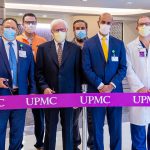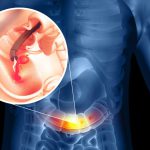 March is Colon Cancer Awareness Month, a time that many in the cancer community spend spreading awareness about the risks and symptoms of the disease. Below, UPMC Passavant’s James Celebrezze, M.D., answers some common questions about colon and rectal cancers.
March is Colon Cancer Awareness Month, a time that many in the cancer community spend spreading awareness about the risks and symptoms of the disease. Below, UPMC Passavant’s James Celebrezze, M.D., answers some common questions about colon and rectal cancers.
Is colon cancer a big problem in the U.S.?
The incidence of colon and rectal cancer is decreasing in the U.S. There are likely many reasons for that. However, colon and rectal cancer represents the third most common cancer and the third most frequent cause of cancer deaths in the U.S. In 2015, the American Cancer Society estimated that 130,000 new cases of colon and rectal cancer were diagnosed, and 50,000 people lost their fight with colon and rectal cancer.
Who is at risk of developing colon and rectal cancer?
In reality, everyone is. The risk of developing colon and rectal cancer may be increased in certain groups, like patients with ulcerative Colitis or Crohn’s disease, in patients with a family history of colon cancer or polyps, or in certain hereditary conditions; but everyone, both men and women, are at some risk of developing colon and rectal cancer.
What are some signs and symptoms I should watch out for?
Rectal bleeding, change in the frequency of your bowel movements, unexplained weight loss or abdominal pain are some of the symptoms associated with colon and rectal cancer. Unfortunately these symptoms are also not very specific and the presence of symptoms may suggest more advanced disease. Colon cancer typically arises from polyps, which are growths on the lining of your large intestine. The most common symptom of a polyp is actually no symptom at all.
What can I do to protect myself from colon and rectal cancer?
Lots of things have been looked at from dietary modifications to medications to lifestyle changes but to date the best preventive measure one can do is screening. Multiple options exist, but most experts advocate periodic colonoscopy as the single best screening tool. In the general risk population (that’s everyone without an elevated risk), that screening should start at the age of 50. In elevated risk populations, screening may begin much earlier depending on individual circumstances. Colonoscopy is both diagnostic in that it can detect polyps or cancers, but also has the benefit of allowing for the removal of polyps, thereby preventing colon or rectal cancer from developing.
What do I do if I’m diagnosed with colon and rectal cancer?
The first thing is to realize that there is help and hope for you. The majority of these cancers are treatable and beatable if appropriate treatment is received. Ignoring the problem is almost never the right thing to do. Talk to your doctor and seek care from experts in colon and rectal cancer treatments.








